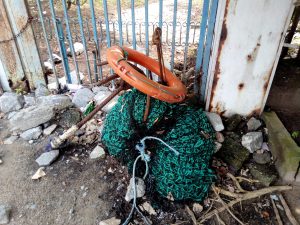Marine Plastic Pollution: Waste disposal patterns vital in control
Facts have been documented in several studies on how marine species ingest plastic and are suffocated, entangled and drowned by plastics in the marine body.
Reddy (2018) citing the United Nations, noted that 80 per cent of the marine debris affecting 800 species worldwide is plastic waste. His work also noted that 13 million metric tonnes of plastic waste end up in the ocean annually, with more evidence that micro plastics end up in the seafood humans consume. So, we are not immune to the danger of marine plastic pollution.

Photo Credit: Marinenetworkng
The concerns also have been that the plastic waste enter the marine body as a result of human activities, particularly where communities are close to coastal areas.
And like Reddy (2018) also observed of findings from several studies, sea turtles have suffered starvation after ingesting plastic waste, which would have filled their stomach. One of such areas is the Tarkwa Bay beach in Lagos Nigeria. On a recent visit for a shoreline inspection, Marine and Environment Care group saw waste single-use plastics lined the shore of the beach.
For the records, a dead whale was found washed ashore sometime in April 2020, in Bonny Island, Rivers State, Nigeria. Cause of the death is yet to be given as research institutions concerned have yet released results of their laboratory investigations.
Besides that, the prevalence of plastic waste on the sand bank of beaches affects the reproduction of the turtles as the waste alter the temperature of the sand, where the turtles incubate.And the fact as evident that sand-mining takes place here, the turtles would not have a safe place for incubating, leaving them endangered in those areas.
Another important note by the World Animal Protection (2017)is that each year, about 640, 000 tonnes of lost and abandoned fishing equipment threaten marine life including seals, whales and turtles. (We saw a lost/abandoned fishing net at the shore in Tarkwa Bay Beach).
Of course, impact of human activities from the beach community. Overlooking Tarkwa Bay beach is also the new Eko Atlantic City and Victoria Island which is part of the heart of Lagos businesses.
But, I disagree with some inferences that COVID-19 pandemic be blamed for increase single-use plastic. The simple fact is that the problem is with the poor plastic waste disposal patterns among communities of plastic users.
The pandemic might have caused more people to package food and drinks for takeaways but, that should not mean littering the environment with the waste plastic, not minding where it goes to.
We must begin to care about where our rubbish end, by ensuring proper disposal after use, in covered waste bins for onward carriage to the landfill. There are worries again, however, that adequate attention is given to properly secure the waste while being transferred as wind usually blow away some of the waste (usually plastics) and end up being carried into nearby rivers and into the oceans.
OurWorldinData has shown in a study (2018) that through waste from previous years, the 275 million tonnes of plastic waste actually exceeded the 270 million tonnes annual primary production.
By that study, an estimated 31.9 million tonnes of plastic waste improperly managed, found their way into the environment. And of that percentage, 8 million tonnes – representing 3 per cent of the annual plastic waste the ocean through multiple outlets, including rivers (2018).
It is time to take responsibility for the kind of ocean we want- Healthy Oceans.
Advocacy had been strong pushing for cuts or total ban of production of single-use plastics- legislation has backed those calls in places like Kenya.
Then, beyond legislation, we can make right choices by using eco-friendly made wares such as grocery bags and cutleries. We are able to save cost on the long run and work towards a healthy ocean.
But, if people must use plastics, then they have the responsibility of ensuring they dispose of the waste properly. A lot of encouragement has gone into advocating that people recycle waste plastic as well- and some stipend is received.
Recently, some students at the Maritime Academy of Nigeria, having been exposed to marine environment protection interaction at a conference held in the Academy, put their thoughts together and experimented with the idea of using PET bottles to create lifejackets. The result was great. They tested the life-jackets swimming in the Academy’s standard swimming pools. They are working on improving on the innovation.
In the same vein of turning waste to wealth, a Nigerian woman, Bashir Kurfi , has also found an enterprise in the waste-to-wealth model. She makes interlocking tiles using plastic waste (BBC, 2020).
Her success story is that she encourages high school students to bring single-use plastic waste and in return, they get solar bulbs as tokens of appreciation and encouragement to be a part of the environmental management programme.
UNICEF(2018) also gives a detailed report on how plastic waste are being turned into bricks, which are longer –lasting , for building their much-needed classrooms for students.
“Côte d’Ivoire needs 15,000 classrooms to meet the needs of children without a place to learn. To help fill this gap, UNICEF has partnered with Conceptos Plasticos to use recycled plastic collected from polluted areas in and around Abidjan to build 500 classrooms for more than 25,000 children with the most urgent need in the next two years, with potential to increase production beyond,” (UNICEF,2018).
References:
1.Hannah Ritchie (2018) – “Plastic Pollution”. Published online at OurWorldInData.org. Retrieved from: ‘https://ourworldindata.org/plastic-pollution’ [Online Resource].
2.Intissar Bashir Kurfi: Meet di lady wey dey turn pure water leather to inter-locking tile. https://www.bbc.com/pidgin/media-52684664
3.Simon Reddy (2018). Plastic Pollution Affects Sea Life Throughout the Ocean.
https://www.pewtrusts.org/en/research-and-analysis/articles/2018/09/24/plastic-pollution-affects-sea-life-throughout-the-ocean#:~:text=Fish%2C%20seabirds%2C%20sea%20turtles%2C,suffocation%2C%20starvation%2C%20and%20drowning.&text=Plastic%20waste%20kills%20up%20to,their%20stomachs%2C%20sometimes%20causing%20starvation
4.UNICEF breaks ground on Africa’s first-of-its-kind recycled plastic brick factory in Côte d’Ivoire
5.How plastic pollution is affecting seals and other marine life(2017)
By Hope Orivri , Lead Communication Specialist, Communication for Human and Environmental Development, Marine& Environment Care.
